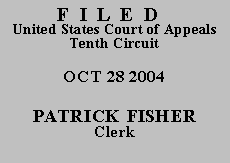

| JAMES PATRICK BOLTON, |
|
| v. | |
| LARRY REED, Warden; ATTORNEY GENERAL OF THE STATE OF COLORADO, |
(D.C. No. 03-B-283 (PAC) ) |
Mr. Bolton's § 2254 petition arises out of his Colorado conviction of one count of second-degree kidnaping, three counts of second-degree burglary, and three counts of sexual assault on a child. Mr. Bolton received a sentence of 172 years in prison for these convictions. The Colorado Court of Appeals affirmed Mr. Bolton's convictions and sentence on direct appeal, and the Colorado Supreme Court denied his petition for a writ of certiorari. Subsequently, Mr. Bolton filed post-conviction motions in the Colorado trial court. The trial court denied his motions, and the Colorado Court of Appeals affirmed those rulings. The Colorado Supreme Court then denied Mr. Bolton's petition for a writ of certiorari in the post-conviction proceedings.
In the instant § 2254 action, Mr. Bolton raised the following claims: (1) his trial attorney provided ineffective assistance of counsel in violation of the Sixth Amendment by failing to allow him to participate in formulating defense strategy and failing to advise him whether he should testify; (2) his attorney on direct appeal provided ineffective assistance by failing to raise certain issues and by ineffectively arguing the claims that he did raise; (3) his attorney in the state post-conviction proceedings provided ineffective assistance; (4) his attorney in the appeal of the post-conviction proceedings provided ineffective assistance; (5) an impermissbly suggestive lineup and limited cross examination deprived him of his rights to due process, equal protection, and confrontation; (6) perjury by a prosecution witness and alteration of the transcripts to conceal the perjury deprived him of those same rights; (7) the trial court erred in allowing evidence of similar transactions and thereby violated those same rights; (8) the trial court's error in allowing hearsay testimony of a child violated those same rights; (9) the bias of the trial court violated his due process, equal protection, and Eighth Amendment rights; (10) the Colorado statute regarding evidence of similar acts is unconstitutionally vague and was applied in a manner that violated his rights to due process, equal protection, and confrontation; (11) the denial of his right to testify violated his rights to due process, equal protection, and confrontation; (12) the trial court's cumulative errors deprived him of those same rights.
The magistrate judge concluded that Mr. Bolton's third and fourth claims--that he received ineffective assistance of counsel in the post-conviction proceedings and resulting appeal--did not allege violations of federal rights and were thus not cognizable in a § 2254 proceeding. See Rec. doc. 30, at 4 (Recommendation, filed Jan. 30, 2004). As to Mr. Bolton's remaining claims, the magistrate judge concluded that Mr. Bolton had failed to exhaust them in the Colorado courts and that they were procedurally barred as a result. The magistrate judge further concluded that Mr. Bolton had failed to demonstrate either cause and prejudice or a fundamental miscarriage of justice excusing the procedural bar. Upon de novo review, the district court adopted the magistrate judge's recommendation and dismissed Mr. Bolton's petition.
To appeal the district court's denial of his § 2254 petition, Mr. Bolton must obtain a COA by making "a substantial showing of the denial of a constitutional right." 28 U.S.C. § 2253(c)(2). Mr. Bolton may make this showing by demonstrating that "'reasonable jurists would find the district court's assessment of the constitutional claims debatable or wrong.'" Miller-El v. Cockrell, 537 U.S. 322, 338 (2003) (quoting Slack v. McDaniel, 529 U.S. 473, 484 (2000)). "[A] claim can be debatable even though every jurist of reason might agree, after the COA has been granted and the case has received full consideration, that [the] petitioner will not prevail." Id. Moreover, because he seeks to proceed IFP in this appeal, Mr. Bolton must also demonstrate a financial inability to pay the required fees and "a reasoned, nonfrivolous argument on the law and facts in support of the issues raised on appeal." McIntosh v. United States Parole Comm'n, 115 F.3d 809, 812 (10th Cir. 1997) (internal quotation marks omitted).
For substantially the same reasons set forth by the magistrate judge, we conclude that Mr. Bolton is not entitled to a COA and is not entitled to proceed IFP. The magistrate judge's recommendation reflects a careful analysis of the record and is supported by the applicable law. Mr. Bolton's appellate brief does not present a colorable argument undermining the magistrate judge's conclusion that most of his claims were unexhausted and procedurally barred and that his claims regarding ineffective assistance of post-conviction counsel are not cognizable in a § 2254 proceeding. Although Mr. Bolton again alleges that many of his claims were not exhausted because of his post-conviction counsel's deficiencies, the ineffective assistance of counsel in post-conviction proceedings does not constitute cause by which a § 2254 petitioner may avoid the procedural bar. See Demarest v. Price, 130 F.3d 922, 941 (10th Cir. 1997).
For substantially the same reasons set forth in the magistrate's recommendation we DENY Mr. Bolton's application for a COA, DENY Mr. Bolton's motion to proceed IFP, and DISMISS this appeal.(*)
Entered for the Court,
Robert H. Henry
Circuit Judge
*. We also deny Mr. Bolton's motion for appointment of counsel.